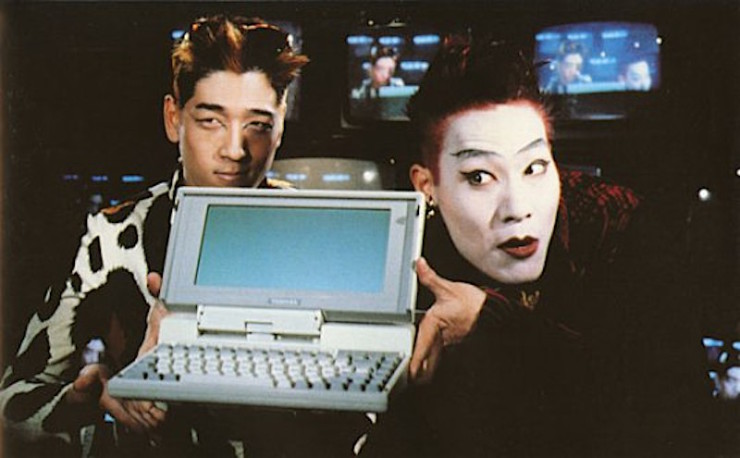Ah, the ’90s. A time when the internet exploded up from its underground world of ARPANet and BBS, and became a thing everyone was expected to use. Like all new media, the net was subject to a lot of hype, and a lot of fearmongering, as non-1337s began using it for the first time.
One of the greatest results of this was that glorious cinematic moment when films began using decade-old cyberpunk tropes to explore virtual reality, hacking, cybercrime, and what being this brave new virtual world was going to do to the human heart. I have attempted to rank these monuments to a lost era, but as always, my rankings are highly subjective. By all means yell at me that Johnny Mnemonic should place higher on the list! I value your opinion nearly as highly as shirts that have been laundered. Like they do. At the Imperial Hotel… in Tokyo.
10. Mindwarp (1992)
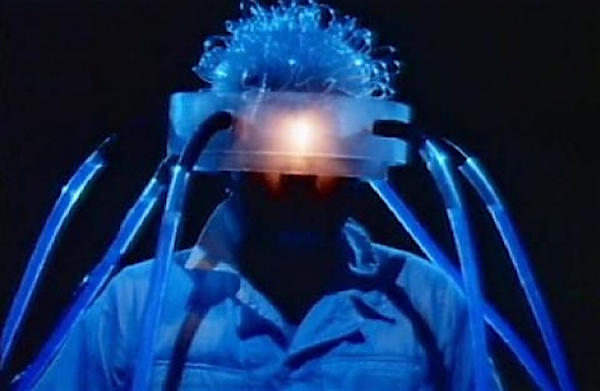
Humans give up their autonomy for VR called “InfiniSynth, for in the grim dark of this generic, vaguely post-apocalyptic future, there is only war. Well, and cannibalism, and blood sacrifices, and Bruce Campbell.
Judy Apple hates life in the future: she shares a tiny room with her mother, hooked into InfiniSynth via what appears to be a serial cable in the base of her skull. InfiniSynth is a VR system that can let her live any fantasy she wants. The machine stimulates her muscles, and “wakes” her occasionally to eat green pudding and use the bathroom. There’s a giant painting of a forest on one wall, that sort of gives the whole thing a “‘70s-basement-rec-room” vibe. Honestly, and I hate to be a downer here, but this is my idea of Eden. And Judy, with her last name invoking both damnable curiosity and the All-Holy Mr. Jobs, throws this paradise away. She wants to eat solid food, and exercise, and leave the tiny room to see what real life is like.
What a sap.
Unfortunately for the movie, her adventures IRL turn out to be generic post-apocalyptic fare, and the only memorable moments are provided by Bruce Campbell’s character Stover, after hallucinogenic leeches drive him insane. (That sentence makes this film sound far more awesome than it is.)
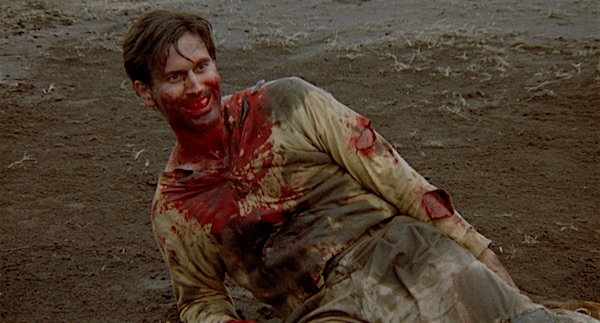
There is also the annoying possibility that parts of the movie are nested simulations, and several arguments with the Systems Operator, who controls everyone’s simulations, but the film doesn’t explore the “What is reality” question nearly enough to be interesting. But! There is one good thing to be said about Mindwarp: Bruce Campbell met his wife on set! He and costume designer Ida Gearon have been married since 1991, and they’re adorable together. So that’s worth it, right?
Are we in the future? 2037! But with InfiniSyth, we can be anywhere and anywhen we want to be. Which apparently isn’t good enough for precious Judy.
Can I Get A Gibson? There is no William Gibson here.
Have we received a harrowing vision of a future that has since come to pass? Weirdly, yes! As far as I can tell the creators of Mindwarp also invented the Roomba:
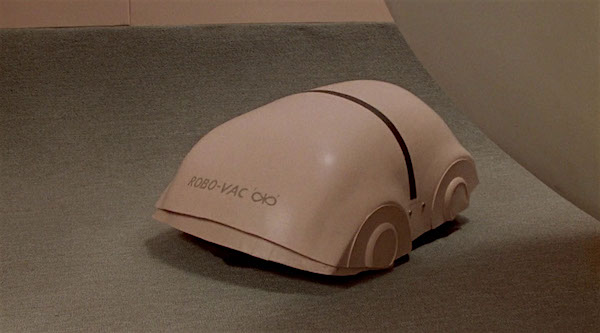
Is the advent of VR eroding humanity’s sense of identity? Yes and no. InfiniSynth allows people to live their dreams, but it’s all only happening in their minds… which is soon revealed to be better than “real life”.
Has the advent of virtual reality caused you to contemplate the nature of consciousness itself, humanity’s place in the universe, and perhaps the idea that being able to create a new form of reality will elevate humanity to a new, god-like status? When Stover tries to explain the Bible to Judy, who has never seen a real book, she replies that if people want to meet God, InfiniSynth will simply program it for them. Heavy, man.
1337speak: “Infinisynth: more fantastic than fantasy, more real than reality. The ultimate experience is Infinisynth. It’s all been remade for you and it’s anything you want it to be. It’s your reality. Let your dreams come true in your very own world. Hook into the happiness system. Relax, imagine, enjoy. Hook in.”
1337 or sux0rz? sux0rz
9. Brainscan (1994)
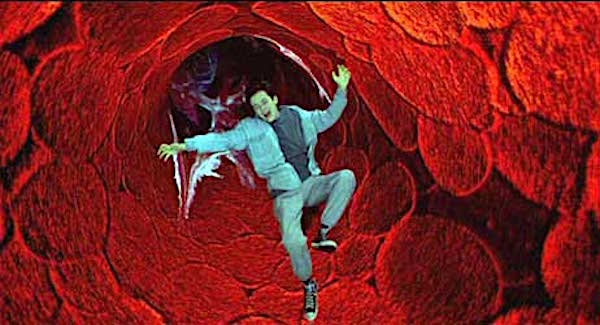
Ugh this movie. Slightly cool premise: kid sends away for an interactive CD Rom horror game called Brainscan, kid commits murder inside the game, oh shit murder might be real! Sounds fun, right? But no, the film gives you just enough depressing backstory on the kid, Michael, that the whole film becomes a tragedy instead of cheesy horror. Plus, most annoyingly for me, it seems to want to equate violent video games with real violence, and fetishizes the grungy kids who read Fangoria and watch horror movies, making the wayyyy too easy assumption that they’re emotionally-stunted, violence-addled losers. Some of us were, sure, but plenty of us turned out OK, and are still turning out OK. Dammit.
The film presents the initial stabtastic murder as though the viewer is playing a first person shooter (er, stabber?) which is a great touch. The second murder really commits to the VR aspect of the premise – Michael, panicking, records himself playing, in the hopes that he’ll prove his innocence. We cut to him waking up drenched in sweat, and then he plays the video and watches himself play the game. This is fantastic, and could have made for a commentary on virtual reality, the immersive nature of gaming, and the power of imagination. But what we see is that he simply gets up and walks out of the room, offscreen. Michael runs to his freezer and finds evidence that he killed again after he left. So, somehow, the game hypnotizes you into physically going to someone’s house and murdering them—at which point the film stops being interesting, and turns into a standard thriller.
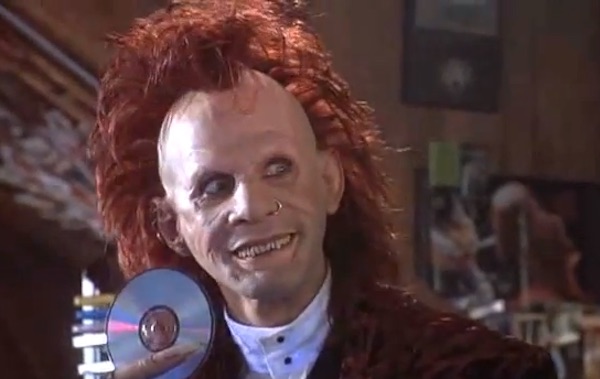
Now why does Michael keep playing this terrible murdergame, you might ask? It’s because when he tries to quit, the game’s host, Trickster, comes out of the TV Sadako-style and demands that he keep going. I will say that T. Ryder Smith does a fantastic job as Trickster. I will also say that the actor playing Michael, Edward Furlong, seems singularly unimpressed with the terrifying punk crawling out of the game and into his bedroom. Other than that – how does Trickster come out? Is this magic or VR? Is he a demon? Are we in a supernatural movie, or a sci-fi movie, or a combination? This film never gives us the rules of its world, and all the tension just drains right out like blood from a stab wound.
Are we in the future? The film is resolutely set in the 1990s. It’s a sea of flannel, and Brainscan, as I mentioned, is a CD rom, and every teen’s room is plastered with an unlikely number of Aerosmith posters (presumably an homage to star Edward Furlong’s role in the “Livin’ On the Edge” video). However, it’s future tech enough that his phone is hooked up through his computer, which responds to voice commands. The VR itself appears to be completely mystical: he starts the game, and falls through what looks like a virtual wormhole to actually enter the game. Then he goes into a trance state while watching the TV screen, and wakes up later, full of adrenaline, remembering murdering someone in the game. The film toys with questions of reality, virtual reality, and dreaming, but it’s more invested in dumb twists than any real exploration.
Is the internet a city? Despite the fact that (unlike most American teenagers in 1994) Michael has his own personal computer, there is ZERO mention of the internet.
Can I Get A Gibson? Bwahahahaha!!! No.
Have we received a harrowing vision of a future that has since come to pass? Oddly enough, haunted CD Rom murder games never really took off.
Is the advent of VR eroding humanity’s sense of identity? Michael insists he’s not a killer, but each time he goes into the game he seems to become a little more murder-friendly.
Has the advent of virtual reality caused you to contemplate the nature of consciousness itself, humanity’s place in the universe, and perhaps the idea that being able to create a new form of reality will elevate humanity to a new, god-like status? Trickster never touches on that? He does say, “Real? Unreal? What’s the difference?” once, when Michael yells at him about being an IRL murderer.
1337speak: “It’s interactive dude! You’re in the game man. You’re in control!”
1337? Or sux0rz? sux0rz. So much sux0rz.
8. The Net (1995)
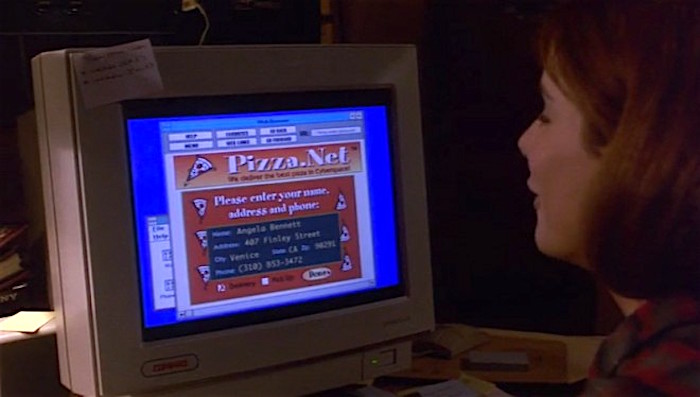
The Net possibly doesn’t belong on this list, but since its plot is driven by a nefarious crew of hackers, I decided to test its 1337-ness. I must say, I found it lacking in 1337. Rather than celebrating the new life the internet is offering, it plays like a made-for-TV-movie about all the potential dangers that lurk online, and trades on the idea that spending time online will make you anti-social and destroy your life—especially if you’re a woman. Sandra Bullock plays Angela Bennett, a systems analyst who works from her home in L.A., mostly finding viruses in games for a San Francisco-based company. It’s made clear that she has no social life, and rarely sees people IRL. Unfortunately, she stumbles across a piece of backdoor software that’s poised to take down the entire U.S. government! The aforementioned hackers attack: her identity is stolen, she’s framed for a series of crimes, she’s seduced by the head hacker, a handsome British man named Jack Devlin, and her ex-boyfriend is poisoned (since he’s played by Dennis Miller, who dials his usual whine straight past “11” and all the way up to Caillou, no one minds too much), and this is all possible because she doesn’t have meatspace friends to confirm her identity. Or, you know, paper records or school photos or a birth certificate at a hospital or relatives other than her mother with Alzheimers.
I can sum up what’s wrong with this movie in one scene: having declined an IRL date, Sandra Bullock orders a large garlic and anchovy pizza, (Online! In 1995! From a site called “pizza.net”!), pours herself a glass of wine, and switches one of her roughly twelve monitors from a “fish tank” screensaver to a “crackling fireplace” screensaver. At which point she settles in alone with her GIANT PIZZA and cyber chats for the rest of the night. I think this was meant to tell us that Sandra Bullock is socially awkward? And maybe in 1995 that’s what it conveyed. In 2016, however, it looks like she’s just embarked on a fantastic evening.
Are we in the future? We are trapped in 1995.
Is the internet a city? According to The Net, the internet is THE DEVIL.
Can I Get A Gibson? Yes! Sandra Bullock’s favorite cocktail is a Gibson – a schmancy old-school martini with onions instead of olives. (NB: They are delicious.)
Have we received a harrowing vision of a future that has since come to pass? Well, we received the vision of what a lot of us wanted 1995 to be, and now we have it, and it’s great. You tell me you don’t want to live in a world where you can order pizza online. Go ahead. I’m waiting.
Is the advent of VR eroding humanity’s sense of identity? The Net believes that the internet is destroying everything in our lives. Nobody tell the filmmakers about VR, they might have a collective heart attack.
Has the advent of virtual reality caused you to contemplate the nature of consciousness itself, humanity’s place in the universe, and perhaps the idea that being able to create a new form of reality will elevate humanity to a new, god-like status? Nope! The Net never gets that deep.
1337speak:
Jack Devlin: “God we’re pathetic aren’t we? We’re here on the most beautiful beach in the world, and all we’re thinking is…”
Angela Bennett: “Where can I hook up my modem.”
Angela Bennett: “Our whole world is sitting there in the computer. Our little electronic shadow – you know what, they’ve done it to me, and you know what, they’re gonna do it to you.”
Or sux0rz? sux0rz!
7. The Lawnmower Man (1992)
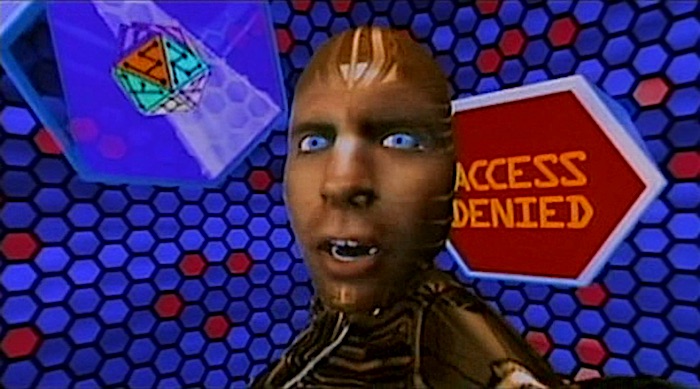
OK, this movie is glancingly based on a Stephen King story, but what you need to keep in mind is that Stephen King—the man who gave the world Maximum Overdrive—sued to have his name removed from this movie. Pierce Brosnan plays Dr. Larry Angelo, who believes that “virtual reality holds the key to the evolution of the human mind!” When his funding and VR chimps are taken away from him, he asks mentally-handicapped landscaper Jobey if he likes video games, and, hearing a yes, leaps right over all ethical boundaries to inject him full of drugs and plug him into a virtual reality machine. This launches poor Jobey into a series of blue and green screensavers filled with glowing neon shapes and spinning mathematical equations. Dr. Larry watches on a computer screen as Jobey’s brain seethes and crackles, apparently super stimulated by the three-dimensional Lisa Frank Trapper Keeper that is his new world.
Now since this is, at heart, a schlocky horror movie, super intelligence also = telepathy, telekinesis, and teleportation, and soon Jobey is wreaking sweet vengeance on everyone who was ever mean to him. He’a also boffing one of his landscaping clients, after she seduces him by saying, “Well, I’m looking forward to having my lawn mowed.” Eventually Jobey goes mad with power, at one point turning himself into a giant lawnmower and destroying a guy’s brain:
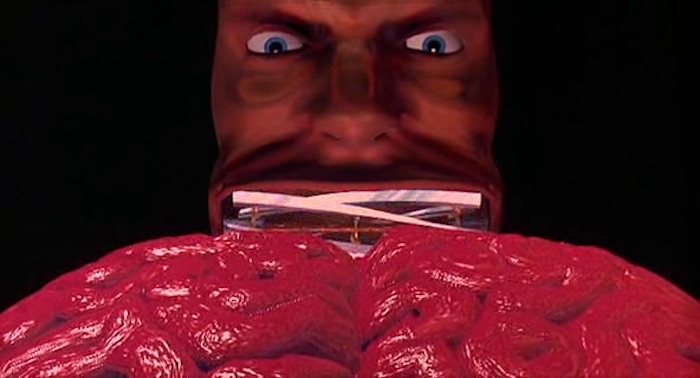
and, naturally, trying to become the internet itself. Coincidentally, the horrifying financial success of this film caused director Brett Leonard to go mad with power, and he decided to corner the market on VR movies by making Virtuosity. But moviegoers balked at naked virtual Russell Crowe, and thus Brett Leonard’s reign of terror was ended.
Are we in the future? I don’t think so? It’s unclear. The tech is obviously advanced from what was actually available in 1993, but there is no other indication that anything’s different.
Is the internet a city? Nope. Lisa Frank Trapper Keeper!
Can I Get a Gibson? I’m going to assume that no one involved in this has heard of William Gibson. Well, OK, the designers have, but unfortunately they were not the final authority on the film.
Have we received a harrowing vision of a future that has since come to pass? So far, my near-constant use of the internet has not enabled me to squeeze toothpaste tubes with the power of my mind. I’m saying no.
Is the advent of VR eroding humanity’s sense of identity? Dr. Larry’s wife is displeased by his daily use of VR, saying “Falling, floating, and flying? So, what’s next, fucking?” Presumably Dr. Larry used to be more involved in their relationship, but Mrs. Dr. Larry is written as such a cardboard shrew that I’m not sure the movie wants me to empathize with her.
Has the advent of virtual reality caused you to contemplate the nature of consciousness itself, humanity’s place in the universe, and perhaps the idea that being able to create a new form of reality will elevate humanity to a new, god-like status? Hmmm, let me think… “I SAW GOD! I TOUCHED GOD!”… “I AM GOD HERE”… “CYBERCHRIST”… yeah, I think maybe this film touches on this a little bit. And then there’s the film’s tagline: “God made him simple. Science made him a god.”
1337speak:
“Someone’s hacking into the mainframe from the outside…they’re in!”
“…my birth cry will be the sound of every phone on this planet ringing in unison.”
1337? Or sux0rz? It depends on the movie experience you’re looking for. Do you want to see Pierce Brosnan get cyber-crucified? Because Lawnmower Man is probably your only opportunity for that.
6. Virtuosity (1995)

This is one of those films that has several better films trapped inside of it, screaming to get out, like, I don’t know… a program that has gained sentience screaming to escape its hellish life inside a computer? At various points it attempts to be a genuinely creepy exploration of psychosis, a look at a future world where nanotechnology allows sentient computer programs to grow bodies from glass, and a commentary on society’s love for violent entertainment and reality TV. But it never commits to any of those ideas, and we end up with Mid-90s-Movie, Plot A, in which A Cop Whose Family Was Murdered becomes An Unfairly Imprisoned Man, before he morphs into The Only Renegade Cop-on-the-Edge Smart Enough to Catch The Bad Guy. And obviously The Bad Guy has to turn out to be The Bad Guy Who Killed the Cop’s Family and Taunts Him Repeatedly with That Fact, you know, to add nuance. (There’s also a dash of We’re Not So Different, You and I.) Virtuosity is only this high on the list because Denzel Washington freaking commits, and Russell Crowe is unexpectedly entertaining as a scenery-chewing villain.
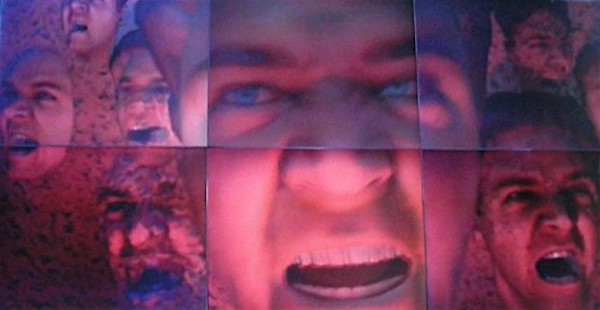
In an attempt at summing up the plot: Dr. Darrel Lindenmeyer (played by Stephen Spinella, who originated the role of Prior Walter in Angels in America, and whom I assume ran screaming back to Broadway after this atrocity) creates a model criminal by programming the personalities of 200 different murderers into Russell Crowe, names him SID (Sadistic, Intelligent, and Dangerous), and then seems shocked (shocked!) when SID gains sentience and wants to be set loose to inflict evil on the world. Except then he totally sets him loose, which leads to SID invading a warehouse rave and orchestrating people’s screams, SID hijacking an MMA fight, and SID hacking a TV call-in show and offering to commit different types of murders according to viewers’ votes.
Are we in the future? I assume so—Denzel Washington has a synthetic arm, the cops wear militaristic uniforms, there’s nanotech, and obviously the advance AI. But all the cars and buildings seem like standard mid-90s fare.
Is the internet a city? Nope. Director Brett Leonard likes his internets bright, blocky, and, as I mentioned above, Lisa Frank-esque.
Can I get a Gibson? Nope!
Have we received a harrowing vision of a future that has since come to pass? This film kind of predicted American Idol? But with murder instead of singing.
Is the advent of VR eroding humanity’s sense of identity? SID was only programmed with the aforementioned 200 murderers’ personalities, so his entire sense of identity is shaped by that.
Has the advent of virtual reality cause you to contemplate the nature of consciousness itself, humanity’s place in the universe, and perhaps the idea that being able to create a new form of reality will elevate humanity to a new, god-like status?
Lindenmeyer: “Oh my god.”
SID 6.7: “Which god would that be? The one who created you? Or the one who created me? You see, in your world, the Lord giveth and the Lord taketh, but in my world, the one who gave me life doesn’t have any balls.”
1337speak:
“I am made of everything! I am the future!”
“You’re in my world now!”
“I’m a fifty terabyte, self-evolving, neural network, double backflip off the high platform. I’m not a swan dive.”
1337? Or sux0rz? sux0rz, except for the super-1337 scene of Russell Crowe at the warehouse rave.
5. eXistenZ (1999)

eXistenZ posits a world in which a woman, with ladyparts, can be publicly declared the greatest game designer in the world, and a room full of people begin to murmur appreciatively instead of immediately attempting to dox her. That’s how we know we’re in a fantasy. More importantly, we’re in a David Cronenberg fantasy, in which there is no greater horror than the human body, which is why people play games by plugging fleshy game pods straight into their bioports—orifices at the bases of their spines that allow them to enter the virtual reality of the game. Yes, there is lubricant involved.
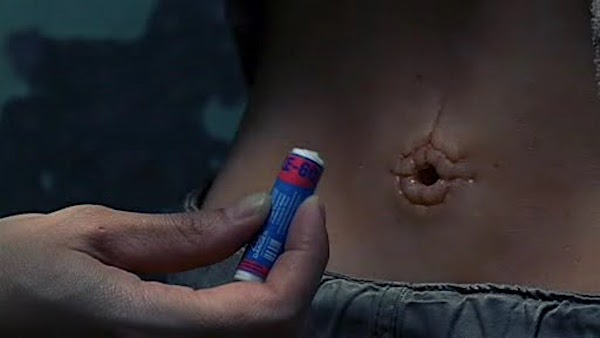
Ted Pikul (an especially inhuman-looking Jude Law) and game designer Allegra Goodman (Jennifer Jason Leigh) hop in and out of an extremely immersive game. OR DO THEY? Seriously, do they? Cause I’m still not sure what I watched. There are at least a few layers here, but the film does a good job of messing with your idea of which realities are reality, and which are virtual. The acting is fairly wooden, but that might be a commentary on the vice acting in video games. The reason it’s so low on the list is simply that rather than engaging with gaming culture, and really exploring some of the questions it raises about what immersive VR would do to our perception of reality, the film settles for promoting an anti-gaming stance and swerving into a shock ending that doesn’t allow for nuance.
Are we in the future? Yes! It’s a bit vague, but the gaming pods and bioports are obviously advanced, and society seems to have changed because of their popularity. Allegra mentions that no one skis in real life anymore, for instance.
Is the internet a city? The world of eXistenZ (from Antenna Research) changes as you play. You might be in a town, or a Chinese restaurant, or a trout farm, or Ian Holm’s spacious loft… the possibilities are endless.
Can I get a Gibson? No Gibsons here, just bioports. Ick.
Have we received a harrowing vision of a future that has since come to pass? Gaming is the biggest entertainment industry now, and controversies in the gaming world are shaping the culture of the internet as a whole. So, yeah, Cronenberg’s idea of a world where game designers were practically worshiped and where gaming itself was seen as the premiere human pastime, has definitely come true.
Is the advent of VR eroding humanity’s sense of identity? “I’m feeling a little disconnected from my real life. I’m kinda losing touch with the texture of it. You know what I mean? I actually think there is an element of psychosis involved here.”
Has the advent of virtual reality caused you to contemplate the nature of consciousness itself, humanity’s place in the universe, and perhaps the idea that being able to create a new form of reality will elevate humanity to a new, god-like status?:
Ted: “Free will is obviously not a big factor in this little world of ours.”
Allegra: “It’s like real life. There’s just enough to make it interesting.”
1337speak: “eXistenZ. Written like this: One word. Small ‘E’, capital ‘X’, capital ‘Z’. ‘eXistenZ’. It’s new, it’s from Antenna Research, and it’s here… right now.”
1337? Or sux0rz? I’ll say 1337 with some trepidation. It is an interesting film.
4. Johnny Mnemonic (1995)
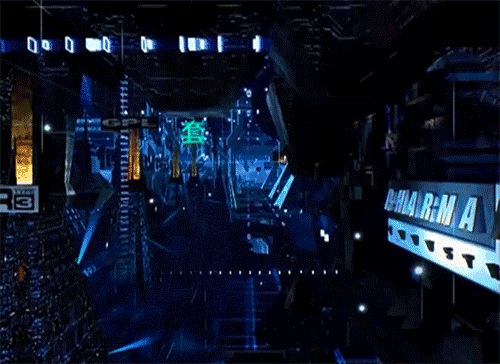
Sometimes there’s work of art so perfect, so uniquely itself, that it’s almost as though it’s a missive from some better, purer world. Johnny Mnemonic is such a missive. You might think I’m being silly? Facetious? But nay. I love everything about this film. Let’s begin with the fact that the film opens with the words “Internet—2021”. Immediately we know that we’re in the future, but more than that—we’re in cyberspace. We have slipped the bonds of Earth and entered the beautiful future promised to us by Tron. If there’s a better way to introduce a film, I’ve never seen it. Henry Rollins plays a doctor named Spider, who screams all of his lines. Just, screams them. Ice-T has an anarchy symbol carved into his forehead, and calmly utters such bon mots as “Shit, it’s the yakuza” and “The only way left—you gotta hack your own brain.” Wait, did I mention the telepathic dolphin? BECAUSE THERE’S A TELEPATHIC DOLPHIN. Dolph Lundren stalks the streets, sneering “Jesus time!” and stabbing people with a giant crucifix! And, as in most of these films, the view of cyberspace is just, well, sweet. As you can see in the above pic, it’s laid out like a three-dimensional neon city, with bit and bytes and ram whizzing around like cars, and glowing pathways that mimic IRL highways. Here, watch Johnny hack.
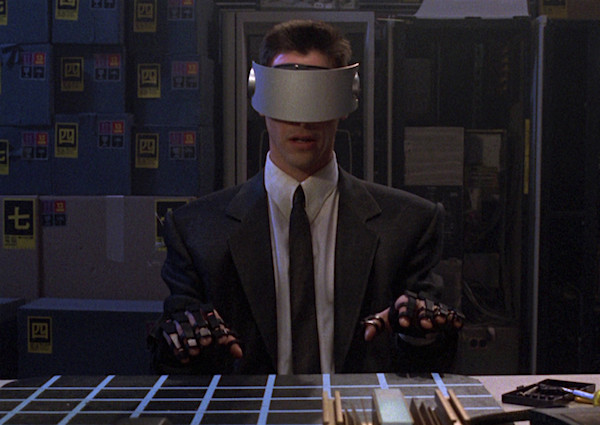
So, the plot: Johnny is a courier, meaning he has an illegal storage pod in his brain that reads as an anti-dyslexia patch when he goes through scanners. He can store and carry sensitive information, and deliver it in person to ensure that no prying eyes see it. There are two problems here: first, he needed to dump part of his own memory to make room for the pod, and, more problematically, if he overloads the pod it’ll leak into his brain and kill him. This is initially presented as the primary conflict, but it soon recedes into the background as he’s doublecrossed, various yakuza attempt to decapitate him to get the info, and we learn more about Nerve Attenuation Syndrome, also known as NAS or “the black shakes”, which seems to be a side effect of living in a hyperwired world. But hey, why am I explaining all this when you could watch the best bits edited into a three-minute clip?
Of all the films on this list, I think this one might come the closest to the cyberpunk aesthetic. Jane’s mesh shirts, Johnny’s sarariman suit, the ragged, patched-together look of Ice-T and his gang of Lo-Teks going up against the slick yakuza—for all the film’s absurdity, it gets the look down perfectly. And can we take a minute to discuss Keanu Reeves’ performance?
Are we in the future? Internet, 2021!
Is the internet a city? Yes! A glorious blue and green city!
Can I Get a Gibson? He wrote this muther.
Have we received a harrowing vision of a future that has since come to pass? Let the l0s3rs lament their lack of hoverboards: I Want! A Telepathic! Dolphin! On a slightly more serious note, while Gibson’s vision of an immersive, head-mounted VR internet hasn’t come to pass, Johnny does request a Thomson Eyephone, which was a real VR rig designed by Jacob Lanier in the ’90s. It never caught on.
Is the advent of VR eroding humanity’s sense of identity? Hang on, I believe Dr. Spider would like to share an opinion: “This causes it! (smacks computer) This causes it! (smacks other computer) This causes it! (smacks a third computer) Information overload! All the electronics around you poisoning the airwaves. Technological fucking civilization. But we still have all this shit, because we can’t live without it.”
Has the advent of virtual reality caused you to contemplate the nature of consciousness itself, humanity’s place in the universe, and perhaps the idea that being able to create a new form of reality will elevate humanity to a new, god-like status? We only get a hint of it in the U.S. release of the film, but the Japanese “Director’s Cut” goes into more detail about Street Preacher’s Church of the Retransfiguration, which claims that God has sent the plague of NAS to encourage people to embrace cybernetic implants and become post-human.
1337speak:
J-Bone, describing Jones, a dolphin: “The way the Navy got him hooked up? He cuts through hard encryption like a knife cuts through butter.”
Johnny, who has no idea they’re talking about a dolphin: “Codebreaker. Good. Can’t wait to meet him.”
1337? Or sux0rz? So deeply, wonderfully 1337.
3. Hackers (1995)
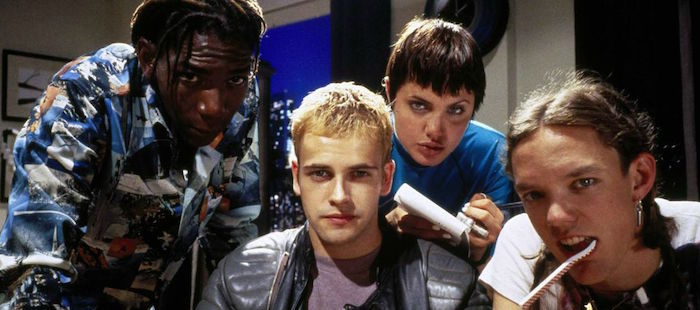
This movie is almost certainly better than you remember it being. While it isn’t exactly a realistic look at teen life in New York City, it does a decent job of showing the conflict between the hacker subculture and people who thought the internet was going to kill us all. It’s also pretty accurate in showing the hope for the internet to be a diverse wonderland where people could be free of prejudice, hatred, misogyny, the pressures of capitalism, the obsession with physical appearance… you know, all that stuff that the internet totally made a reality.
The plot is a corporate espionage/heist confection, wrapped in a fondant of teen subculture. In 1988, young Seattle-ite Dade Murphy, know by his handle ‘ZeroCool’ crashed 1,507 different system, including the New York Stock Exchange. He was banned from computers and touchtone telephones until his 18th birthday. We cut to said birthday. ZeroCool, now going by the handle “Crash Override”, moved to New York with his mom, starts his senior year in a new school, and meets lots of new friends, who weirdly enough all turn out to be hackers. Like, full-time hackers, who occasionally show up at school, and include Phantom Phreak, Cereal Killer, Acid Burn, Lord Nikon, and, um, Joey. Joey doesn’t have a handle yet, because he’s a total n00b. Unfortunately when the rest of them challenge him to pull off a “righteous hack”, Joey manages to get into the Gibson—the supercomputer belonging to Ellingson Mineral Company. Their evil security guy Fisher Stevens (who sails around the office on a skateboard, sleeps cuddled up with cans of Jolt Cola, and likes to dispense wisdom like “There is no right and wrong. There’s only fun and boring”) is laundering money from Ellingson via a worm disguised as a virus. It gets complicated. But the TL;DR is that he wants to make patsys out of our plucky hackers! This leads to a giant hack-off.
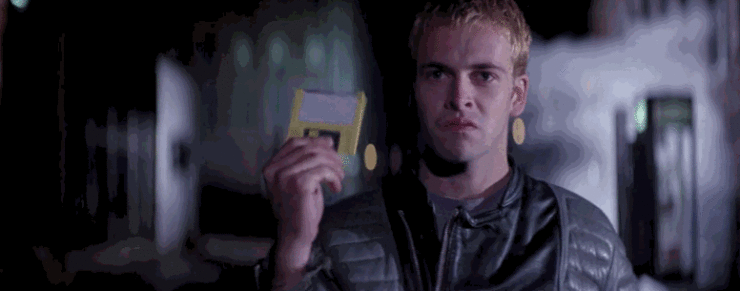
Are we in the future? Nope, ’90s! although a few of the products featured weren’t on the market yet, so this film, like The Wizard before it, served as a stealth advertisement for Wipeout and the Pentium Pro. There’s also a fascinating cultural history unfolding here—Crash Override is from Seattle, goes by the alias Eddie Vedder, and has Nirvana and Soundgarden posters on his wall. However, in the film he only listens to electronica, most of it from British artists. It’s a brilliant way to show the mid-90s shift from grunge culture to rave culture, while also showing how Crash is trying to leave his past behind him. Plus, the soundtrack has aged wayyyy better than it would have if it was all tracks from In Utero and Vitalogy. While the film didn’t do too well at the box office, the soundtrack spawned two sequels!
Is the internet a city? As Crash’s plane soars over Manhattan, the grid of my beautiful city fades into a glowing green and blue circuit board, with tiny bits zipping around like cabs. Each time the characters hack, the internet is alternately represented by spinning equations (alá Lawnmower Man) and brightly colored city blocks (alá Johnny Mnemonic). After implying that this is simply what the hackers imagine as they work, Crash’s actual laptop screen shows us this view while he’s hacking the Gibson at the end, implying that the internet-as-cityscape is an objective reality. And yes, as the film ends, and the camera pans up over Manhattan, it turns back into a circuit board.
Can I get a Gibson? Not only is the supercomputer called a Gibson, but Evil Fisher Stevens refers to hackers as “samurai” and “keyboard cowboys”—which are almost certainly riffs on Gibson’s phrase “console cowboy”. Plus his henchman Penn Jillette is named Hal (as in 9000) and Evil Fisher Stevens himself goes by the alias Babbage, as in Charles.
Have we received a harrowing vision of a future that has since come to pass? Well, yeah. Acid Burn uses a P6 processor, which later came out as a Pentium Pro, and she plays an early version of Wipeout XL. Oh, wait, did you mean all the awesome stuff about the internet sparking curiosity and erasing racial, gender, and class prejudice? Then no.
Is the advent of VR eroding humanity’s sense of identity? That what the FBI agents seem to think, but the film implies that the kids are never more themselves than when they’re hacking.
Has the advent of virtual reality cause you to contemplate the nature of consciousness itself, humanity’s place in the universe, and perhaps the idea that being able to create a new form of reality will elevate humanity to a new, god-like status?
Ramon: “What are the three most commonly used passwords?”
Joey: “Love, secret, and uh, sex.”
Cereal Killer: “Don’t forget God! System operators love to use God. It’s that whole male ego.”
When Cereal Killer reveals the nefarious plot via a pirate television signal, he muses “Yo, I kinda feel like God.” The camera cuts to a view of the satellite the signal is presumably bouncing off of, providing us with an omniscient view of Earth and its hackers.
1337speak:
“Remember, hacking is more than just a crime. It’s a survival trait.”
“Type ‘cookie’, you idiot.”
1337? Or sux0rz? This films pulls off the righteous hack of rising above a silly premise and being fun as hell, and thus becomes 1337.
2. The Thirteenth Floor (1999)
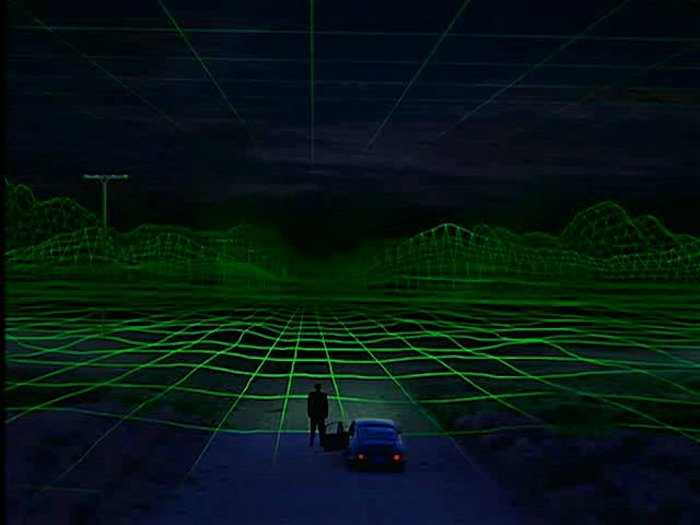
Sometimes films have terrible luck. In The Thirteenth Floor’s case, a stylish noir/cyberpunk mashup with good performances and some interesting things to say about reality … premiered two months after The Matrix. As you can imagine, it was not embraced by moviegoers (many of whom were too busy going to see The Matrix for the third of fourth time) and it was absolutely savaged by critics. It doesn’t help that it starts with white type on a black card saying: “I think, therefore I am” –Descartes, 1596-1650.
As iconic opening quotes go, this is generic. Aggressively generic. But it gets better! Hannon Fuller, Douglas Hall, and Jason Whitney have pioneered a new type of VR. Basically, “The System” is an ongoing simulation of 1937 Los Angeles. The people there live their lives, never knowing that they’re inside a computer. When a user wants to visit the city, he drops in and takes over his counterparts body, does whatever he wants for a few hours, and then wakes back up in the present, while his avatar wakes back up in the simulation with no idea what’s just happened. Unfortunately, some of the sims are beginning to wake up to their predicament, and some of the users are starting to realize that this whole game is morally bankrupt. Then Fuller is murdered, and his daughter shows up to shut the company down. But is she his daughter? Did Hall murder Fuller? Is the Fuller in the system the real Fuller?
Are we in the future? Sometimes. Sometimes we’re in 1937 Los Angeles.
Is the internet a city? 1937 L.A., as mentioned. And as a bonus, modern L.A. fades into a computer grid for a few key moments of symbolism.
Can I get a Gibson? Martinis abound, including one crammed into a shot glass, but alas, no one thought to drop an onion in one of them. There’s also no mention of William Gibson, since The Thirteenth Floor is going for a more noir vibe than a cyberpunk one.
Have we received a harrowing vision of a future that has since come to pass? Probably. But we won’t ever know, so does it really matter?
Is the advent of VR eroding humanity’s sense of identity? Oh yeah. Each of the characters spends too much time in their simulations, using them “as their own personal playgrounds”. In some cases this brings out tendencies toward adultery and even murder. In others it just causes existential despair. Either way, the fun is short-lived.
Has the advent of virtual reality caused you to contemplate the nature of consciousness itself, humanity’s place in the universe, and perhaps the idea that being able to create a new form of reality will elevate humanity to a new, god-like status? The Thirteenth Floor dives right into the question of human identity. Can, say, a computer simulation that knows it’s in a computer be said to have consciousness? And does consciousness = soul? At what point does a computer simulation, designed by another human, become a human itself? Who gets to define this shit?
1337speak: “…He was jacking into the system a lot.”
1337? Or sux0rz? Surprisingly 133t! This is definitely the most noir of the movies on the list, and I think if it hadn’t come out in the wake of both The Matrix and Dark City, it would have become more of a cult hit.
1. The Matrix (1999)
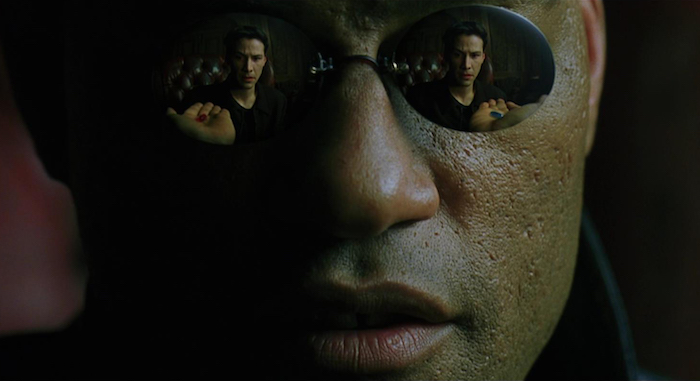
Coming in at #1 is the Wachowski Sisters’ iconic cyberpunk film. I have a visceral memory of not wanting to see this movie because I’d seen Johnny Mnemonic. I may have even said “Haven’t we already seen Johnny Mnemonic? God.” at least once on the way to the theater. I also have a visceral memory of realizing, about ten minutes in, that I had been wrong. This film took all the promise of the ’90s cyber-boom, and turned it into an exploration of personal identity, rebellion against conformity and corporocracy, the nature of reality, the responsibilities that come with power, and most of all, the battle between free will and fate. Is Neo destined to be The One? Is Trinity destined to love him? Or does he become The One because of Trinity’s love for him? Or because of his decision to rescue Morpheus?
Are we in the future? As of the first Matrix Morpheus believes it’s about 2199. People who are still inside The Matrix think it’s 1999.
Is the internet a city? It’s just green digital rain all the way down, man. Try not to think about it too much.
Can I get a Gibson? “The Matrix” is the name of the internet stand-in that Gibson created in Neuromancer, so it’s safe to say there’s some influence here. Gibson himself called the film “arguably the ultimate ‘cyberpunk’ artifact” although he felt it was more Dickian that Gibsonian.
Or, have we received a harrowing vision of a future that has since come to pass? Well obviously we’re all curled up in pods. Sorry, Emmet.
Is the advent of VR eroding humanity’s sense of identity? Each person’s sense of themselves has been shaped by The Matrix. Its implied that maybe this shifts a bit once they get out, but also, in the famous “My name is Neo” scene, that people have an intrinsic identity that they can assert even in the face of the Agents and obliteration. At least, that’s what I choose to believe.
Has the advent of virtual reality cause you to contemplate the nature of consciousness itself, humanity’s place in the universe, and perhaps the idea that being able to create a new form of reality will elevate humanity to a new, god-like status? Hoo, boy. Neo is a messianic figure, his name is an anagram of ‘One’, which is playing with the fact that his eventual partner’s name is ‘Trinity’ and that the person who betrays him is named ‘Cypher’. The machines behind The Matrix see themselves as more evolved than the humans, while the humans see themselves as oppressed, and name their city ‘Zion’ in an obvious echo of ancient Hebrews dreaming of freedom from the Egyptians. The Oracle riffs on the Oracle of Delphi, and the entire story plays with Plato’s Allegory of the Cave.
1337speak:
Spoon boy: “Do not try and bend the spoon. That’s impossible. Instead… only try to realize the truth.”
Neo: “What truth?”
Spoon boy: “There is no spoon.”
Neo: “There is no spoon?”
Spoon boy: “Then you’ll see, that it is not the spoon that bends, it is only yourself.”
1337? Or sux0rz? There is no suxorz.
Finally, coming in at #0, the Greatest ’90s Cyberpunk/VR/Hacker movie of them all:
0. Strange Days (1995)
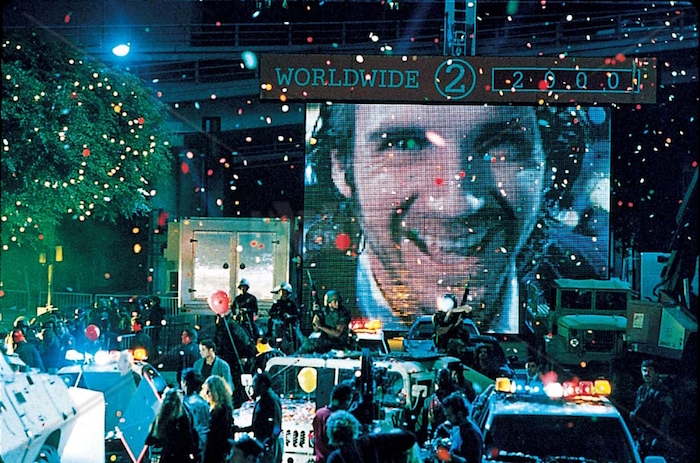
When I started this project, my belief that The Matrix would come out on top was as strong as Morpheus’ belief in Neo. But then I rewatched Strange Days. I hadn’t seen the film in years, and I was astonished by its urgency, and, most of all, by the way it tells intersecting stories for several different audiences. Lenny Nero (Ralph Fiennes) is still mourning his breakup with up-and-coming rocker Faith (Juliette Lewis). An ex-cop, he’s become a sleazy peddler of illegal VR clips. One of Faith’s label-mates, rap icon Jeriko One, is brutally murdered, and the only surviving witness is a friend of Lenny’s, who happened to record the murder. The truth of the murder has the potential to rip L.A. apart, but Lenny’s best friend Mace (Angela Bassett) believes he has the moral duty to publicize it. So, a full, even overstuffed plot, yes? But that just scratches the surface!
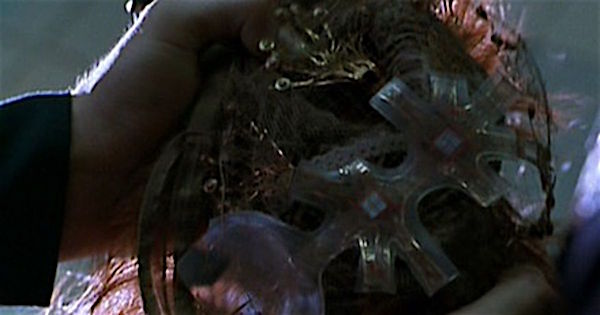
The VR system in Strange Days is a S.Q.U.I.D.—a “Superconducting Quantum Interference Device.” It’s a clip of someone’s life, straight from their cerebral cortex, recorded onto a MiniDisc. Since the experience goes straight into the user’s mind, they see and feel exactly what the subject does. In a good world, this tech could be used to end every prejudice. But in this world, it’s mostly used for sex, and occasional snuff. It’s also called “playback” for a reason—the clips allow people to relive their dearest memories as often as they want. As you might imagine, this takes a toll on life in the present. The clips also allow us to be in the mind of a serial killer who films his crimes (like a much better version of Brainscan) but Bigelow is a master at making the crimes so grotesque that there’s never any thrill. This film also grapples with racial conflict better than any film I can think of since. While it does back off from being truly revolutionary in its last moments, it tackles police brutality and ghettoization head on.
Are we in the future? Um, futurepast? Strange Days came out in 1995, but Bigelow’s vision of the end of the 20th Century is pretty accurate, but oddly enough the type of VR Lenny peddles is only really beginning to take off now.
Can I Get a Gibson? Yes! The classic Gibson cocktail reappears here at the end of the list—one of Lenny Nero’s clients drinks one while they hash out his fee.
Have we received a harrowing vision of a future that has since come to pass? Strange Days could be released tomorrow and be hailed for its prescient take on racism and violence. And the VR is still just futuristic enough to still be fun.
Is the advent of VR eroding humanity’s sense of identity? Mace has an opinion on this one I think she’d like to share: “Memories are meant to fade. They’re designed that way for a reason. This is your life, right here, right now! It’s real-time, you hear me, real time! Time to get real, not playback. You understand me?”
Has the advent of virtual reality cause you to contemplate the nature of consciousness itself, humanity’s place in the universe, and perhaps the idea that being able to create a new form of reality will elevate humanity to a new, god-like status? It’s more like it shows us just how depraved humanity can get.
1337speak: “Have you ever jacked in? Have you ever wire-tripped? This is not like ‘TV only better’. This is life. It’s a piece of somebody’s life.”
1337 or sux0rz? Well, it’s the top of the list, what do you think? I love this movie, and I’m glad I rediscovered it!
All right! I got us through an entire decade of MiniDiscs and warehouse raves and some regrettable hair-bleaching decisions, and we’ve landed safely back in 2016. Now seriously, where’s my goddamn telepathic dolphin? Oh, and did I miss any movies? What are your favorite film hackers and cinematic virtual reality adventures?
Leah Schnelbach wants the cold Mexican beer. You can talk to them on Twitter if their head doesn’t BLOW UP first.










